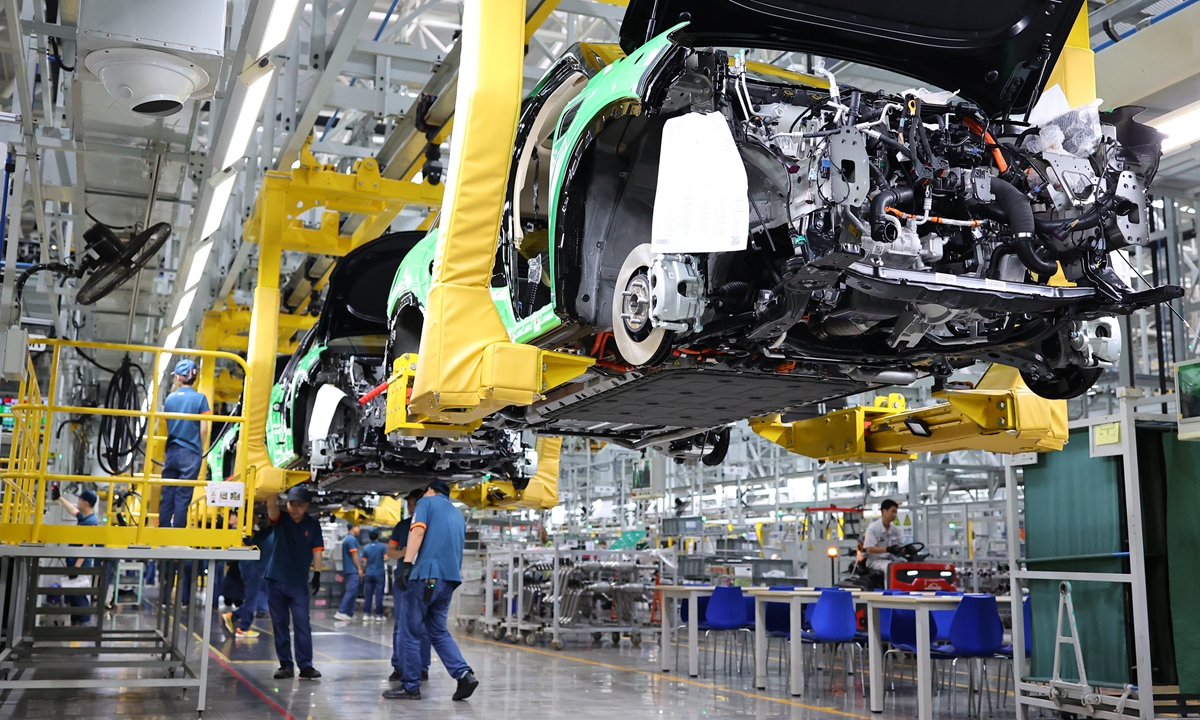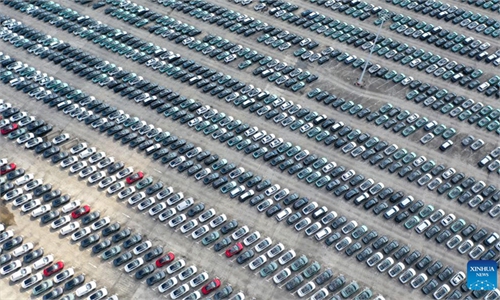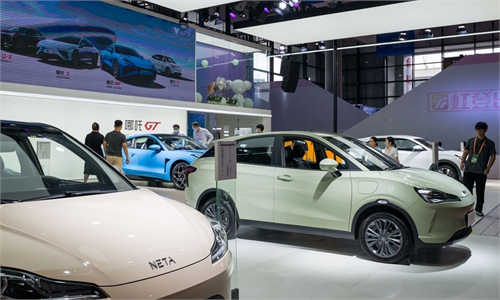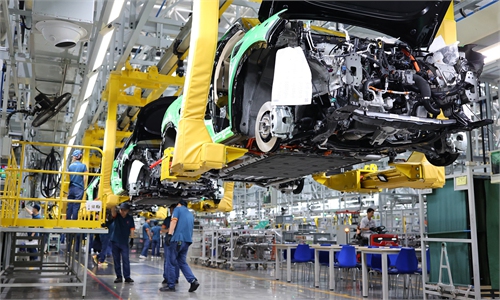Western 'threat' hype on China's hybrid vehicle sector 'exaggerated', neglects domestic technological accumulation, innovation efforts

Workers assemble new-energy vehicles (NEVs) at a plant in Southwest China's Chongqing Municipality to fill overseas orders on September 21, 2023. NEV exports totaled 727,000 units in the first eight months of 2023, up 110 percent year-on-year, data from the China Association of Automobile Manufacturers showed. Photo: VCG
Western media outlets have intensified their hype on Chinese-made vehicles' "threat" to international brands and overseas markets by focusing their attention on the hybrid vehicle segment, a type of vehicle that belongs to the new-energy vehicle (NEV) sector alongside pure electric battery-powered electric models.
Fixated only on the rocketing number of hybrid vehicle sales, Western media outlets are turning a blind eye to the efforts of domestic players in upgrading technologies, enhancing innovation and releasing models that meet consumers' demand in a proactive way, which their international peers can't quickly follow, experts told the Global Times.
The comment came after a Reuters report on Tuesday saying that the growing popularity of two types of hybrids - plug-in hybrids (PHEVs) and extended-range hybrids (EREVs) - made by Chinese automakers have affected sales of internal combustion models and also gasoline hybrid vehicles (HEVs), a segment that Toyota pioneered with the Prius in the late 1990s.
Sales of HEVs in China, where Toyota still dominates with four top-selling models, tumbled 15 percent, while gasoline car sales dropped 11 percent, according to the Reuters report.
An HEV is a type of hybrid vehicle that combines a conventional internal combustion engine system with an electric propulsion system, which is intended to achieve better fuel economy and better performance than a conventional vehicle.
Japanese automakers have been competitive in the HEV field, where the likes of Toyota have a sizable lead. Against this backdrop, Chinese auto firms found another path by focusing more on the PHEV technological route, represented by products of Shenzhen-based BYD and NEV start-up Li Auto.
Sales of HEVs in the Chinese market are only one-quarter those of PHEVs, and the former's share has been falling, Yale Zhang, managing director at consultancy Automotive Foresight, told the Global Times on Tuesday.
"Compared with domestic plug-ins, Japanese HEV products lack advantages in terms of prices and tax breaks," Zhang noted, adding that the latter charges a high premium.
The rise of Chinese automakers in the hybrid vehicle field will mean competition for their international peers, but this could not be called a threat as it is a market-driven result, he said.
Since 2022, PHEVs (including EREV models) have shown a super-strong growth trend and contributed to a huge increase in NEV sales as a whole, becoming the core growth driver for the overall auto market.
Sales of pure electric models in October stood at 585,000 units, a year-on-year increase of 14.4 percent, while sales of PHEVs reached 298,000 units, a jump of 78.2 percent. Of the total number of NEVs, PHEV models accounted for 34 percent, industry data showed.
Li Auto sold a record 40,422 vehicles in October, up 302.1 percent on a yearly basis, according to the China Passenger Car Association. Li Auto's models, all being sport utility vehicles, come with a fuel tank for charging the battery.
"Chinese firms have grasped key technologies in the hybrid sector, and their products are well-received by the market," Xu Haidong, a deputy chief engineer of the China Association of Automobile Manufacturers (CAAM), told the Global Times on Tuesday.
The growing competitiveness of Chinese-made hybrids is largely due to producers' technology exploration and innovation in recent years, their quick response to market demand as the world moves toward a low-carbon model, and China's complete and resilient supply chains that enable mass production and lower costs, according to Xu.
Therefore, it is not objective for Western media outlets to take aim at the outstanding numbers of Chinese-made vehicle sales and exports, but they chose to neglect the efforts behind that, Xu said.
"Their hype mainly has two points: government subsidies and overcapacity in the Chinese market," he noted, adding that the EU, one of the fastest-growing markets for NEVs in the world, needs Chinese-made vehicles, given its vast demand that local companies aren't meeting.
In September, European Commission President Ursula von der Leyen announced that the EU is launching a probe into Chinese-made EVs, claiming that the prices of imported Chinese vehicles are being kept "artificially low by huge state subsidies."
The EU move drew strong opposition from Chinese authorities and industry bodies.
The CAAM said in a statement dated October 4 that the EU's decision to initiate an anti-subsidy investigation was baseless and a clear act of protectionism, adding that it will cast a shadow over the global development of EVs and hinder the progress of the EV industry, including that of the EU.
The automotive industries of China and Europe are partners rather than competitors, and the development of the automotive industry relies on fair competition rather than protectionism, the industry body said.
"We're still communicating with industry bodies in Germany and on the EU level," Xu said, in the hope that the EU could ditch its trade protectionism and create an open market environment.



